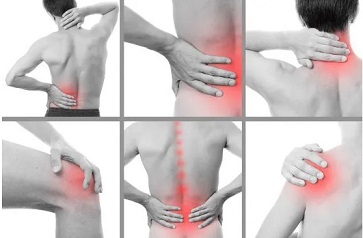COVID-19 News: Scientists Warns Of The Impact Of SARS-CoV-2 On The Musculoskeletal System And Calls For More Research
Nikhil Prasad Fact checked by:Thailand Medical News Team Sep 25, 2023 2 years, 4 months, 2 weeks, 5 days, 3 hours, 27 minutes ago
COVID-19 News: The COVID-19 pandemic has presented an unprecedented challenge to the global healthcare community. Since its emergence in late 2019, the novel coronavirus, Severe Acute Respiratory Syndrome Coronavirus 2 (SARS-CoV-2), has wreaked havoc on populations worldwide, with its primary manifestation being acute respiratory illness. However, as the pandemic has evolved, a growing body of evidence suggests that COVID-19 can affect various organ systems beyond the respiratory tract, including the musculoskeletal system.

In this
COVID-19 News report, we delve into an editorial by French and Italian researchers from Université de Franche Comté, INSERM-France, Surgical Sciences and Technologies, IRCCS-Italy and IRCCS Istituto Ortopedico Rizzoli-Italy warning about the impact and consequences of COVID-19 on the musculoskeletal system, emphasizing the urgent need for more research in this critical area of study.
The Multifaceted Nature of COVID-19
COVID-19 was initially characterized by its respiratory symptoms, ranging from fever and cough to severe pneumonia and acute respiratory distress syndrome. However, as time progressed, it became increasingly apparent that the virus could trigger a diverse array of clinical manifestations, affecting not only the lungs but also the gastrointestinal, cardiovascular, neurological, dermatological, hematological, and musculoskeletal systems.
The Musculoskeletal System's Vulnerability
The musculoskeletal system, comprising muscles, bones, joints, and connective tissues, has not been spared from the impact of COVID-19. Symptoms related to this system can manifest during the course of the infection or persist long after the virus has been cleared from the body. Rheumatologic symptoms have emerged as a noteworthy aspect of COVID-19, including fatigue, myalgia, arthralgia, arthritis, and the development of autoantibodies, sometimes leading to autoimmune diseases. A term known as "post-viral" or "reactive" arthritis has been coined to describe certain arthritis-related clinical features associated with COVID-19.
The Role of ACE2 Receptors
One of the leading explanations for musculoskeletal symptoms in COVID-19 is the presence of angiotensin-converting enzyme 2 (ACE2) surface receptors in various tissues, including muscles, cartilage, bones, and synovium. These receptors serve as the entry point for SARS-CoV-2 into human cells. The widespread distribution of ACE2 receptors suggests a potential mechanism for viral involvement in the musculoskeletal system.
The Research Topic: Shedding Light on Musculoskeletal Involvement
Recognizing the pressing need for a deeper understanding of how COVID-19 impacts the musculoskeletal system, a dedicated Research Topic was initiated. This endeavor aimed to collect original research and review manuscripts that investigate musculoskeletal manifestations observed in COVID-19 patients. A total of six manuscripts were accepted, comprising three original research articles, one mini-review, and two hypothesis and theory articles. These contributions address various crucial aspe
cts of musculoskeletal involvement in COVID-19.
Similarities between COVID-19 and Arthritis
Past research had explored the intriguing parallels between COVID-19 and arthritis. Researchers examined the emergence of autoantibodies and autoimmune diseases in COVID-19 patients, drawing comparisons to conditions like reactive arthritis, rheumatoid arthritis, and systemic lupus erythematosus. This exploration sheds light on the autoimmune aspects of COVID-19.
Susceptibility of Patients with Inflammatory Rheumatic Diseases (IRD)
A critical question concerns the vulnerability of patients with IRD to severe forms of COVID-19. These individuals face unique challenges due to immune dysregulation and immunosuppressive medications, particularly biologic agents. Findings from the Rheumatic Diseases Portuguese Registry and the CovAID study highlight the factors associated with an increased risk of infection and worse outcomes, providing crucial insights for patient care.
Bone Manifestations in COVID-19
The impact of COVID-19 on bones is multifaceted. Osteonecrosis, heterotopic ossifications, and osteoporosis have been observed in COVID-19 patients. The relationship between severe COVID-19 and osteoporosis, often associated with glucocorticoid therapy and prolonged immobilization, remains a topic of debate. Mendelian randomization studies, like the one conducted by Zhang et al., offer genetic insights into this complex relationship.
Muscular Implications of COVID-19
Muscles have emerged as a primary target of SARS-CoV-2 infection, leading to symptoms such as muscle weakness, myalgia, myositis, rhabdomyolysis, and sarcopenia. Veronesi et al. delve into the intricate mechanisms underlying muscle damage in COVID-19, including the role of ACE2 receptors, hypoxia, and the cytokine storm.
Long-Lasting Musculoskeletal Symptoms
A significant number of COVID-19 survivors continue to experience persistent symptoms long after recovery. Defined by the World Health Organization (WHO) as post-COVID-19 syndrome, this condition presents with symptoms like fatigue, widespread pain, weakness, and muscle pain. Plaut examines the "fascial armoring" hypothesis, initially proposed in fibromyalgia, and extends it to long COVID-19, emphasizing mechanical abnormalities in soft tissues, especially the fascia.
Conclusion
In conclusion, the musculoskeletal system's involvement in COVID-19 is a complex and evolving area of study that warrants urgent attention. The diverse range of symptoms and their potential long-lasting effects underscore the need for comprehensive research to elucidate the underlying mechanisms and develop effective treatments. The contributions presented in this Research Topic offer valuable insights into the musculoskeletal impact of COVID-19 and serve as a foundation for further exploration. Researchers and healthcare professionals must continue to collaborate and prioritize this vital area of study to better understand, diagnose, and manage the musculoskeletal consequences of COVID-19. As the pandemic continues to unfold, this knowledge is crucial for providing comprehensive care to affected individuals and preventing long-term musculoskeletal complications.
The editorial by the French and Italian researchers were published in the peer reviewed journal: Frontiers in Medicine.
https://www.frontiersin.org/articles/10.3389/fmed.2023.1288778/full
For the latest
COVID-19 News, keep on logging to Thailand Medical News.
Read Also:
https://www.thailandmedical.news/news/brazilian-study-validates-that-covid-19-infections-also-affects-the-musculoskeletal-system
